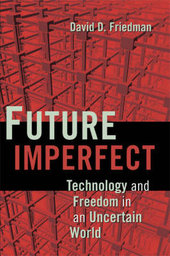
|
Future Imperfect: Technology and Freedom in an Uncertain World
Hardback
Main Details
| Title |
Future Imperfect: Technology and Freedom in an Uncertain World
|
| Authors and Contributors |
By (author) David D. Friedman
|
| Physical Properties |
| Format:Hardback | | Pages:358 | | Dimensions(mm): Height 229,Width 152 |
|
| Category/Genre | Ethical and social aspects of computing |
|---|
| ISBN/Barcode |
9780521877329
|
| Classifications | Dewey:303.483 |
|---|
| Audience | | Tertiary Education (US: College) | |
|---|
| Illustrations |
Worked examples or Exercises
|
|
Publishing Details |
| Publisher |
Cambridge University Press
|
| Imprint |
Cambridge University Press
|
| Publication Date |
21 July 2008 |
| Publication Country |
United Kingdom
|
Description
Future Imperfect describes and discusses a variety of technological revolutions that might happen over the next few decades, their implications and how to deal with them. Topics range from encryption and surveillance through biotechnology and nanotechnology to life extension, mind drugs, virtual reality and artificial intelligence. One theme of the book is that the future is radically uncertain. Technological changes already begun could lead to more or less privacy than we have ever known, freedom or slavery, effective immortality or the elimination of our species, and radical changes in life, marriage, law, medicine, work and play. We do not know which future will arrive, but it is unlikely to be much like the past. It is worth starting to think about it now.
Author Biography
David D. Friedman is Professor of Law at Santa Clara University, California. After receiving a Ph.D. in theoretical physics at the University of Chicago, he switched fields to economics and taught at Virginia Polytechnic University, the University of California at Irvine, the University of California at Los Angeles, Tulane University, the University of Chicago, and Santa Clara University. A professional interest in the economics of law led to positions at the law schools of the University of Chicago and Cornell and thereafter to his present position, where he developed the course on legal issues of the twenty-first century, which led to his writing Future Imperfect. Professor Friedman's first book, The Machinery of Freedom: Guide to a Radical Capitalism, was published in 1973, remains in print, and is considered a libertarian classic. He wrote Price Theory: An Intermediate Text (1986), Hidden Order: The Economics of Everyday Life (1996), and Law's Order: An Economic Account (2000). His first work of fiction, Harald, was published in 2006. Professor Friedman's scientific interest in the future is longstanding. The Cypherpunks, an online group responsible for much early thinking about the implications of encryption, included The Machinery of Freedom on their list of recommended readings. Professor Friedman's web page, http://www.davidfriedman.com, averages over 3,000 visitors a day and his blog, Ideas, at http://daviddfriedman.blogspot.com receives about 400 daily visits.
Reviews'What a delightful and absorbing book! Friedman looks to the future with a science fiction writers sense of the possible combined with a social scientists understanding of what it all might mean.' N. Gregory Mankiw, Harvard University 'Professor Friedman has written a valuable book that explores some of the most interesting issues connecting technology and society in the years and decades to come. His explanations of the technologies are accessible to ordinary readers, and he tees up the societal issues in a lively way. While not everyone will agree on the magnitude of the threats, his treatment of the subjects will make everyone think, from the most expert Internet lawyer to the most enthusiastic geek - indeed anyone who cares about his or her future in a democratic society.' Henry H. Perritt, Jr., Chicago-Kent College of Law 'David Friedman turns his formidable analytical abilities on a number of futures. They won't all happen - but at least one of them almost certainly will. Friedman applies law to economics and economics to the law, to the benefit of our understanding of both. I recommend this book to anyone interested in the future - or any one of several futures. It doesn't hurt that it's a good read, either.' Jerry Pournelle, Best selling science and science fiction writer, high tech columnist
|